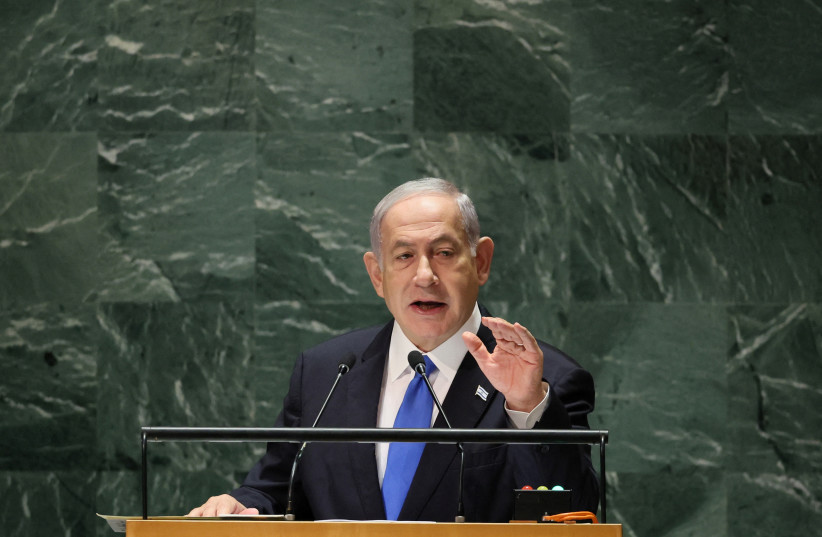Prime Minister Benjamin Netanyahu hinted at the possibility of his coalition considering concessions to the Palestinians as part of their efforts to secure a peace agreement with Saudi Arabia in an interview with two US media outlets over the weekend.
The prime minister spoke to CNN and Fox News shortly after he delivered his address to the United Nations General Assembly on Friday, telling reporters that if he agreed to concessions, he believed his far-right party members would follow.
"Would you be willing to blow up your coalition, essentially, to get this deal with Saudi done?" CNN's Kaitlan Collins asked Netanyahu.
"I don't think it'll require that," he said.
"You think they'll go along with it?" Collins continued. "It's whether I go along with it," Netanyahu responded, deriding statements made by Finance Minister Bezalel Smotrich that no concessions would be made.

"They're just talking," Netanyahu said. "They talk and talk. They are politicians."
Netanyahu: Saudi deal will help Israel achieve Palestinian peace
Netanyahu has positioned a peace deal with Saudi Arabia as a pivotal aspect of his premiership. Yet, the specific nature of concessions toward the Palestinians that his coalition could endorse remains uncertain. In both interviews, he declined to share specifics and even said that it is possible no compromises would need to be made if the Palestinians would benefit from the peace deal in other ways.
"These are the things that I discuss in discreet forums," the prime minister told Collins, stressing that whatever is on the table will not jeopardize Israel's national interests or security.
"But I will say this: I think that making peace with Saudi Arabia and beginning to end the Arab-Israeli conflict will also help us end the Palestinian-Israeli conflict, and I think that is what people miss out," Netanyahu added.
"They think you have to first conclude the Palestinian-Israeli conflict and then go to the Arab world, what is called the 'inside-out' approach," he continued. "I think it is the 'outside-in' approach that has a much greater chance to end both sets of conflicts - that making peace with Saudi Arabia and ending the Arab-Israeli conflict will also end the Palestinian-Israeli conflict."
Last week, Fox News featured an exclusive interview with Saudi Arabian Crown Prince Mohammed bin Salman. In the interview, the crown prince expressed his aspirations for the deal to "reach a place that will ease the life of the Palestinians." Notably, he refrained from explicitly advocating for the establishment of a Palestinian state, deviating from the country's official stance maintained over the past two decades.
However, in his talk at the UNGA on Saturday, Foreign Minister Faisal bin Farhan Al Furhan said that his country expects any solution for people in the region to include an independent Palestinian state with east Jerusalem as its capital.
Netanyahu told Fox's anchor and executive editor Bret Baier that the Palestinians don't want a peace deal with Israel, "they want peace instead of Israel. They don't want a state next to Israel. They want a state instead of Israel."
In his Fox interview, he echoed MBS' sentiments that "we're getting closer to peace every day that passes" but told CNN that the window of opportunity to reach an agreement is relatively narrow.
"If we don't achieve this in the coming months - then the agreement will be postponed for several years," Netanyahu said.
Joanie Margulies contributed to this report.
